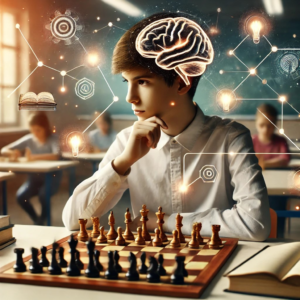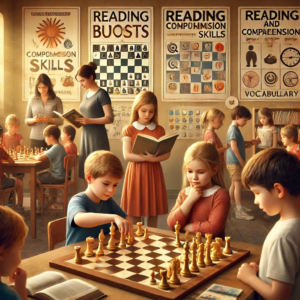The Role of Chess in Developing Academic Excellence
Chess and Academic Success: How Chess Enhances Learning in School
Introduction
Chess, often called the “game of kings,” is much more than a board game. It’s a tool that has been shown to improve cognitive abilities, which directly contributes to academic success. For children, learning chess can become a rewarding activity that boosts their intellectual and personal growth. Let’s dive into how chess can benefit students academically and equip them with lifelong skills.
Improved Memory and Recall
Chess encourages players to memorize strategies, tactics, and move sequences, helping them to quickly recognize patterns. In a study conducted with school-age children, those who played chess showed marked improvement in memory retention and recall abilities. This skill is essential for subjects like history, where remembering dates and events is crucial, and in language arts, where vocabulary and rules need to be recalled consistently. With stronger memory skills, children are better equipped to retain and apply knowledge across their studies.

Enhancing Critical Thinking and Analysis
Critical thinking is a core component of both chess and academic success. In chess, players constantly analyze their moves and anticipate the opponent’s responses, which requires strategic foresight and the ability to evaluate multiple scenarios. This skill is directly transferable to subjects like science, where forming hypotheses and predicting outcomes are essential. As children engage with chess, they naturally enhance their critical thinking and analytical skills, which helps them excel in problem-solving activities and complex reasoning tasks found in their studies.

Strengthening Math and Problem-Solving Skills
Chess is inherently mathematical, with patterns, spatial awareness, and sequences at its core. Each move involves geometric thinking (how pieces move across the board) and calculations (anticipating the best moves several steps ahead). Students who practice chess regularly develop an intuitive understanding of math concepts, such as patterns, probability, and logical progression, which helps them excel in arithmetic, geometry, and even algebra. By mastering chess, students enhance their problem-solving skills and gain confidence in tackling mathematical challenges.

Boosting Reading and Comprehension
Though chess and reading might seem unrelated, the focus and patience cultivated through chess translate to improved reading skills. In chess, children learn to approach each move carefully, which develops patience and attention to detail. These qualities are beneficial in reading comprehension, as students need to understand, interpret, and analyze written material. Some studies have shown that students who play chess have stronger reading comprehension scores, as chess encourages them to concentrate deeply and think critically about the text.

Building Confidence and Resilience
Playing chess fosters resilience by encouraging children to learn from mistakes. Each game presents an opportunity to improve, teaching kids that mistakes are part of the learning process. This growth mindset helps them become more confident, not only in chess but in other areas of life. When they encounter challenges in school, they’re better equipped to persevere, view mistakes as learning opportunities, and confidently tackle difficult subjects.

Conclusion
Incorporating chess into a child’s routine offers much more than just a fun pastime—it becomes a gateway to academic growth and intellectual development. By strengthening memory, critical thinking, math skills, reading comprehension, and confidence, chess provides a foundation for success in both school and beyond. Encouraging children to play chess not only prepares them for academic challenges but also cultivates skills that will benefit them throughout their lives.
